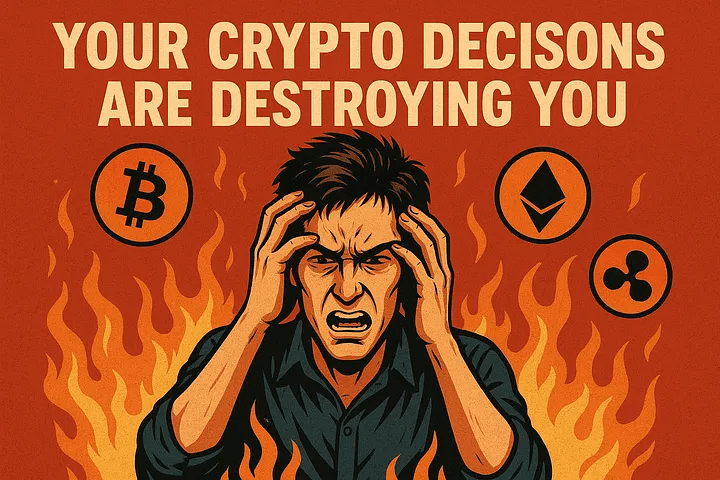Compiled: Plainspoken Blockchain

I stared at my phone screen. 3 AM. My portfolio was down 67%.
Six months ago, I thought I was a genius. Every coin I touched turned to gold. Every decision felt right. Until they weren't.
Do you know what no one tells you about cryptocurrency? It's not the technology that ruins you. It's not the volatility. It's your own mind.
The night everything changed
In December 2021, I made a profit of $42,000. By March 2022, only $8,000 was left.
Not because the market crashed. But because I made every possible wrong decision.
Panic selling at the bottom
Buying at the top due to FOMO
Making revenge trades to 'get back' what you lost
Doubling down on failing projects
I'm not investing. I'm gambling, just with a few extra steps.
Your brain is not suited for this
It took me three years and five-figure losses to realize: your instincts will kill you in the cryptocurrency market.
Every natural human reaction is wrong:
When prices skyrocket, you feel it's safe to buy. That's when you should be cautious.
When everything crashes, you feel fear. That's when opportunity knocks.
When you lose 80% of your portfolio, you immediately want to make it back. That's when you make your worst trades.
Your emotions are not only useless, they actively sabotage you.
My decision-making framework
After losing 80% of my portfolio, I did something radical. I no longer believed in myself.
Instead, I established rules. Ironclad, emotion-free rules.
48-hour rule
Never buy immediately. Write it down. Wait 48 hours. If it still seems reasonable, consider it.
My worst trades mostly happened in the first five minutes of excitement.
Boring portfolio
70% invested in Bitcoin and Ethereum. That's it.
Not sexy. Not thrilling. Won't skyrocket 100x overnight.
But it also won't go to zero while you sleep.
Learning budget
10% for experimentation. For learning. For potentially lost money.
This is tuition. Education has a cost. Pay actively, not passively.
Mistakes every beginner makes
You think you need to know everything. Technical analysis. Tokenomics. DeFi protocols.
Wrong.
You need to understand yourself first.
What makes you panic?
When will you become greedy?
How much loss can you really afford?
Because if you give up at the first red candlestick, no strategy will help.
The skill no one talks about
Patience is not waiting. It's not acting.
Stand by and watch others make money. See opportunities slip away. Accept the possibility of missing out.
This is 90% of successful investing.
Research is not scrolling Twitter.
Research is understanding the fundamentals. Reading whitepapers. Checking on-chain data. Following development updates.
If your research only comes from influencer screenshots, you're not researching. You're praying.
Risk management is not about stop-loss.
But it's about position management. Never invest money that can change your life. Keep enough cash to wait for opportunities.
Most people learn this only after losing everything.
Habits that change everything
Every Sunday, I conduct a decision audit.
What did I buy/sell this week?
Why did I make that decision?
Was it emotion-driven or logic-driven?
What was the result?
Not to judge. But to learn.
You will find patterns. Your triggers. Your weaknesses. Your emotional patterns.
This habit has taught me more than 100 YouTube videos.
The truth about 'correct' decisions
You may make the right decision and still lose money.
You could also make wrong decisions and still get rich.
In the short term, cryptocurrency rewards luck. In the long term, it rewards discipline.
The goal is not to be right every time. But to make decisions you can live with. Based on logic, not fear. Based on research, not rumors. Based on strategy, not hope.
Beginner roadmap
First month: learning the basics
What is blockchain?
How do wallets work?
What is a private key?
Don't buy anything. Just learn.
Second month: simulated trading
Document hypothetical buys and sells
Observe how your performance will change
Pay attention to your emotional reactions
Better not to buy anything.
Third month: start small
Up to $100
Only invest in Bitcoin or Ethereum
Practice using wallets and exchanges
This is not investing. It's training.
The thinking models you need
Think in years, not days
Daily fluctuations are noise. Weekly changes are irrelevant. Monthly movements are almost insignificant.
If you don't think in years, you're trading, not investing.
Assume everything goes to zero
Every coin. Every project. Every investment.
If you can't mentally handle going to zero, you've invested too much.
Learn from failures, don't repeat them
Lost money to scams? That's tuition.
Falling for the same scam twice? That's foolish.
Dialog with yourself
Before every cryptocurrency decision, ask yourself:
Why am I doing this?
What do I expect to happen?
What if I'm wrong?
Can I handle the worst-case scenario?
Is it fear or greed speaking?
If the answer is unclear, don't act. It's not about getting rich
But to avoid becoming poor.
is to slowly accumulate wealth while others burn through it quickly.
is to still be here five years later, while 90% of today's traders have left.
Because cryptocurrency won't disappear. But most participants will—going to zero directly.
Your current choices
You can read this and forget it by tomorrow. Jump into the next hot coin. Follow the next influencer. Make all the mistakes everyone makes.
Or you could decide today: I want to be different.
Not smarter. Not luckier. Just more disciplined.
The market doesn't care about your dreams. It doesn't care about your bills. It doesn't care about your FOMO.
But if you can control your decisions, none of this matters.
Starting today. Not to start trading. But to make a commitment.
Learning comes before making money. Patience beats action. Discipline surpasses emotion.
Your future self will thank you.
Or curse you.
Decisions are always in your hands.



